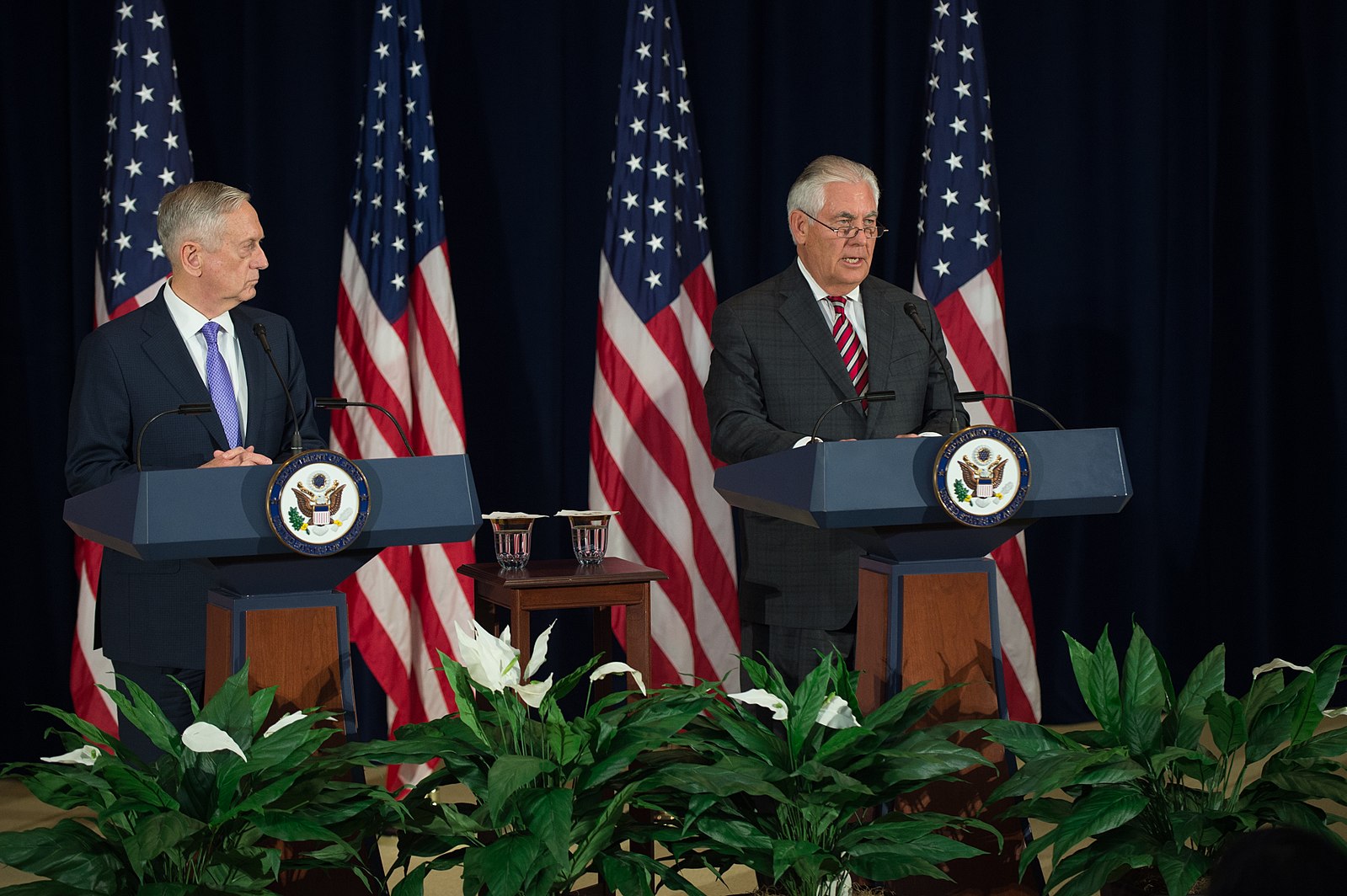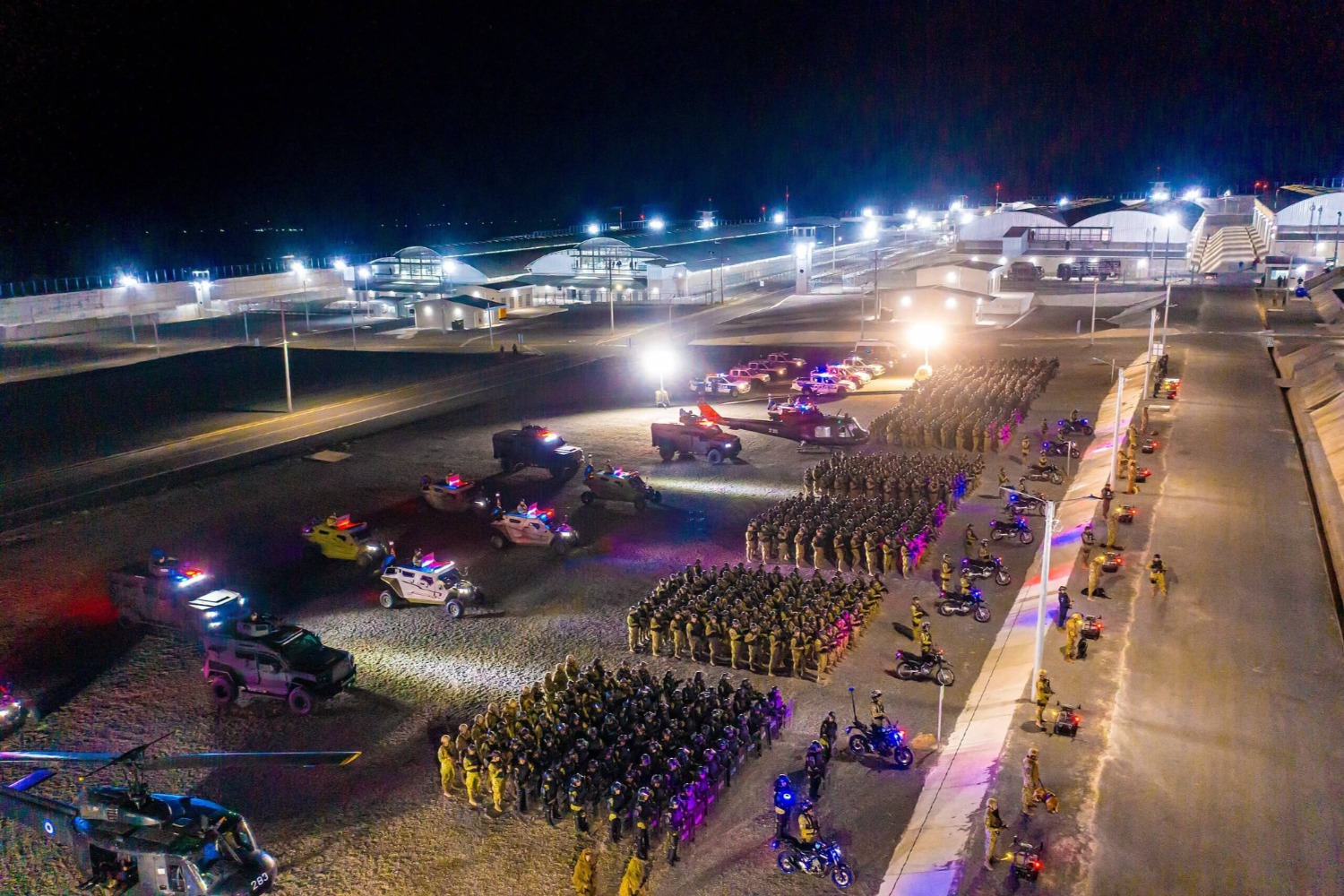Summary: Senate Foreign Relations Committee’s AUMF Hearing
On Oct. 30, the Senate Foreign Relations Committee heard testimony from Secretary of State Rex Tillerson and Defense Secretary James Mattis on the Trump administration’s views regarding the need for a new authorization for the use of military force (AUMF).

Published by The Lawfare Institute
in Cooperation With

On Oct. 30, the Senate Foreign Relations Committee heard testimony from Secretary of State Rex Tillerson and Defense Secretary James Mattis on the Trump administration’s views regarding the need for a new authorization for the use of military force (AUMF). This administration, like the Bush and Obama administrations before it, has relied on the existing 2001 AUMF—and, in some cases, the 2002 AUMF relating to Iraq—for the legal authority to engage in hostilities against al-Qaida and associated forces, including the Islamic State (IS). Critics of this practice maintain that some of these activities, including those targeting IS, are inconsistent with both the text and intent of the AUMFs and thus require new congressional authorization.
The Senate Foreign Relations Committee has previously held hearings on the need for a new AUMF. In 2015, the Obama administration presented Congress with a draft revised AUMF for operations against IS and held related hearings, but Congress never acted on its proposal. In June 2017, the committee heard testimony from experts John Bellinger and Kathleen Hicks. In August, Mattis and Tillerson testified in a closed hearing before the committee.
Several notable discussions emerged from this most recent hearing. In both of their opening statements, and throughout questioning, Mattis and Tillerson expressed the view that, while a statement of congressional unity could be beneficial to operations, the existing AUMFs provided sufficient statutory authorization for the administration’s overseas counter-terrorist operations. They laid out the administration’s necessary conditions for a new AUMF if Congress were to pursue one and discussed their requirements for a “repeal and replace” process should that be required. Several senators, including Committee Chairman Bob Corker, engaged in a conversation regarding the relationship between authorizations for the use of force and appropriations for military activities. North Korea was also mentioned several times, with senators pressing the secretaries on the administration’s position concerning the use of force and the hypothetical conditions surrounding a preemptive nuclear strike. Finally, the recent deaths of American soldiers in Niger prompted questions about the nature of and legal basis for military activities there. Despite Bobby Chesney’s recommendation, members of the committee failed to mention the U.S. citizen whom the United States is holding as an enemy combatant in Iraq. This post summarizes the exchanges concerning these four topics, and briefly reviews the aforementioned omission.
The Trump Administration’s Policy Position on the AUMF
In their opening statements and throughout the questioning, Tillerson and Mattis explained the administration’s requirements for a new AUMF and explored the process they envisioned with respect to implementing one.
The secretaries were consistent in their prepared statements and in their characterization of the administration’s expectations for a new authorization. Both expressed that any new AUMF would need to be free of time constraints, geographical constraints or operational limitations; instead they proposed a conditions-based approach that would end the authorization only once certain targets are met. (These targets were not specified.) The administration’s position is that this broad authorization is necessary to address the dangers posed by al-Qaida and related terrorist organizations due to the transnational and non-traditional nature of the threat they pose. Several senators, including Sens. Jeff Merkley (D-OR) and Jeanne Shaheen (D-NH), raised concerns about this position, particularly because of the broad, unending authority it would create. Merkley implied that the administration appears to be seeking blanket authorization to fight an open-ended war against radical Islamic ideology, concerns echoed by Sen. Rand Paul (R-KY).
Sens. Tim Kaine (D-VA) and Jeff Flake (R-AZ) also took issue with the administration’s suggestions and discussed the revised AUMF they proposed in May, which the current administration opposed. Kaine focused on the administration’s opposition to time constraints. He specifically highlighted the sunset provision in his proposal, which would require Congress to reevaluate authorization after five years, and pointed out that other key authorities, such as the Foreign Intelligence Surveillance Act (FISA) and the National Defense Authorization Acts (NDAAs), have similar provisions. Kaine asked Mattis to acknowledge that those provisions’ time limitations did not interfere with defense efforts nor did they send any signal to our enemies. Mattis agreed, but distinguished those bills from an AUMF as “substantially different,” characterizing an AUMF as a “statement of purpose” and explaining that the other reauthorizations discussed are “intricacies” unlikely to be noticed or understood by the enemy.
Ranking Member Ben Cardin (D-MD) and Sen. Ron Johnson (R-WI) both raised the issue of operational limitations, questioning the secretaries on the use of ground troops. Sen. Johnson noted that limits on ground troops were discussed in 2015, when the senate considered President Obama’s request for a new AUMF. Tillerson reiterated the administration’s position that there can be no operational restrictions when the nature of the enemy is constantly evolving. Mattis echoed this view, and further argued that including operational limitations in an AUMF gives the enemy too much insight into U.S. military strategy.
With respect to a process to repeal and replace the AUMF, Tillerson, in his opening statement, indicated that “new AUMF authorities must be in place prior to or simultaneous with the repeal of old ones.” Mattis deviated from Tillerson in this respect, stating that he was unwilling to categorically state that the existing AUMFs could be repealed at all.
The Relevance of Appropriations
Several participants discussed the relevance that other forms of legislative activity, such as appropriations, has to the congressional intent to authorize the use of force. Corker opened with a statement linking the two, noting his belief that the 2001 AUMF supports the United States’ current scope of activities in part because “Congress has been regularly notified of troop deployments around the world, including the buildup in Niger, and has responded consistently by funding the Department of Defense and its operations against IS and terrorist[s] around the world.” Mattis followed with a similar argument defending the Trump administration’s preference for a minimally restrictive AUMF, noting that “[t]he power of the purse remains firmly vested in [Congress’s] hand should the Executive Branch not present a persuasive case for continuing the campaign.” Both alluded to similar arguments made by the Obama administration that pointed to “funding, oversight, and authorizing measures” that purportedly “convey[ed] Congress’s support for the President’s use of force against ISIL[.]”
This position drew a strong reaction from Flake, who addressed it directly in his remarks. Observing that none of the current members of the committee were in the Senate at the time that the 2001 AUMF was passed, he objected to the proposition that the ability to exercise the “power of the purse” was a sufficient substitute for direct and timely congressional authorization. He contended that using appropriations as a stand-in for authorization in the context of long-standing statutes such as the 2001 AUMF would effectively gut the role that the committee plays in reviewing and authorizing various aspects of U.S. foreign relations, and instead cede this role to the Committee on Appropriations, a shift he felt the committee should resist. He also raised concerns that relying on appropriations as indicators of congressional intent is inconsistent with Congress’s power to authorize the use of military force under Article I of the Constitution, sentiments that were echoed by other members of the committee, including Cardin and Kaine.
Tensions With North Korea
Several senators questioned the secretaries on the administration’s position on military action against North Korea. In response to a question from Senator Cory Gardner (R-CO), Mattis and Tillerson both agreed that North Korea is currently the biggest threat to the United States.
Cardin, in his opening statement, expressed confidence that the existing AUMFs did not cover hostilities against North Korea;Tillerson and Mattis confirmed this. Senator Chris Murphy (D-CT) continued this line of of questioning, asking Mattis and Tillerson to confirm that, absent an imminent threat or actual attack, congressional approval would be required to engage in hostilities. Both Tillerson and Mattis responded by stating that we are currently in the Korean Peninsula under the president’s Article II authority, and that more facts would be needed to give a specific answer. Both secretaries agreed that possession of a nuclear weapon alone could be considered an imminent threat. Notably, neither secretary mentioned international law restrictions on the use of force, such as those arising from the U.N. Charter.
Sen. Ed Markey (D-MA) was the first to express concern about the president unilaterally ordering a nuclear first strike. Mattis was reluctant to say anything concrete about situations in which a nuclear first strike would be used. He agreed that a classified briefing should be provided and a separate hearing should take place to address this issue. In a notable aside, Corker noted that the Congressional Research Service had informed him that the committee had not held a hearing on the process for launching a nuclear attack since the 1970s, and stated his intent to convene one shortly.
In a similar line of questioning, Sen. James Risch (R-ID) asked what would happen if North Korea launched a nuclear weapon at the United States. Mattis explained, in some detail, that ballistic missile defense forces would respond, the president would be provided with options, allies would be consulted, and Congress would be “intimately involved.” Tillerson added that a judgement would be made about whether a proportional response was required, noting that the military has a number of other options. He also cautioned against taking a nuclear first strike off the table entirely, noting that this capability is a key deterrent.
Presence of Troops and Operations in Niger
Mattis also clarified the legal authority under which the four special forces soldiers who were tragically killed in an ambush in Niger earlier this month had been operating –a topic that has led to some confusion in recent days. Contrary to press accounts indicating that the soldiers in question were engaged in activities under the 2001 AUMF, Mattis stated that their mission was authorized under Title 10 “train and equip” authorities, which he identified as the same authorities under which President Obama first deployed special forces to Niger in 2013.
Although Mattis did not say so explicitly, his discussion of Title 10 authorities appeared to refer to 10 U.S.C. 333, a recently enacted statutory provision that consolidated and replaced a number of other long-standing security cooperation authorities that had been littered throughout Title 10 of the U.S. Code. Section 333 authorizes the secretary of defense, with the concurrence of the secretary of state, to “provide training and equipment to the national security forces of one or more foreign countries for the purpose of building the capacity of such forces” for any one of several enumerated purposes, including “[c]ounterterrorism operations.” Niger was the second largest recipient of assistance in sub-Saharan Africa under one of Section 333’s predecessor provisions, underscoring the prominent role that such security cooperation plays in U.S.-Niger relations.
When asked about the need for transparency in Title 10 operations, Mattis noted that several relevant statutes already impose substantial reporting requirements and urged the committee to review the various reports that the executive branch already submits. He specifically cited the Trump administration’s June 2017 consolidated report and several other reports that the Obama administration submitted pursuant to the War Powers Resolution’s reporting requirements, all of which note the existence of U.S. operations in Niger. He added that Title 10 authorities have substantial reporting requirements, which is true of both Section 333 and its predecessor provisions.
Secretary Mattis’s disclosure of the Title 10 basis for the Niger operation led to additional questions on the scope of activities undertaken by the soldiers at the time of the incident. Cardin pressed Mattis on whether the specific operation pursued at the time of the ambush was within the scope of Title 10. In response, Mattis stated:
The mission of those troops on that patrol was a combined patrol which means they were with Niger troops. They were on a patrol where they were teaching them how you do what is called key-leader engagement. . . . [T]hey are there with the Niger troops to train and advise them consistent with the original intent they were sent there under during the previous administration, which continues to be the intent today.
In a subsequent exchange with Murphy, Mattis speculated that, as special forces units had previously conducted over two dozen similar patrols in the area without encountering enemy forces, officers in the field may have reasonably believed there was no substantial risk of hostilities. However, he repeatedly stated that there can be no conclusions until the ongoing investigation into the incident is complete.
No Mention of U.S. Citizen Enemy Combatant
Notably absent from the hearing—despite Lawfare co-founder Bobby Chesney’s calls to the contrary—was any discussion of the U.S. citizen captured fighting alongside IS in Syria whom the U.S. has held as an enemy combatant for at least the past seven weeks. While the significance of this omission is unclear, it may indicate that neither the committee nor the Trump administration is sensitive to the serious legal challenges that any resulting habeas proceedings could pose to counter-IS efforts under the 2001 AUMF.






